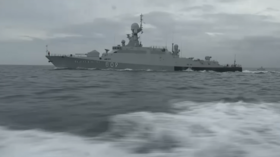Bye-bye, Little Mr. Tritium: Rollout of cartoon MASCOT to promote dumping Fukushima’s radioactive waters into ocean flops in Japan
Japan’s government has scrapped a mascot promoting the plan to dump contaminated Fukushima wastewaters into the ocean just a day after its release, after the cute character received an extremely poor reception from the public.
The mascot, called ‘Little Mr. Tritium’, was withdrawn by the authorities for redesign on Wednesday.
“Since the theme of radiation is highly specialized and difficult to understand, we will use illustrations to get as many people as possible interested,” Japan’s Reconstruction Agency said in a statement.
The agency added it had received “various voices and reactions from the people” regarding Little Mr. Tritium, and said the design will now be revised. No timeframe for the potential return of the mascot has been provided.
Farewell Little Mr Tritium, feels like we never even got to know you 😥https://t.co/lftwAgBFnMpic.twitter.com/nKLHq37vpP
— Martin Hamilton (@martin_hamilton) April 15, 2021
The mascot, featured in animated videos and leaflets, made its premiere on Tuesday and had an extremely short-lived career, lasting for about a day. The character is a small greenish creature, named after tritium – a radioactive isotope of hydrogen, that contaminates over one million tons of water stored in large tanks around the crippled nuclear power plant.
Little Mr. Tritium’s rollout was blasted as an extremely distasteful move, given the gravity of the potential environmental impact the release of radioactive waters might have.
“The gap between the gravity of the problems we face and the levity of the character is huge,” Katsuo Watanabe, an 82-year-old fisherman from Fukushima, told the Kyodo news agency. “It seems the government’s desire to release the water into the sea takes priority over everything.”
トリチウムが復興庁にゆるキャラにされてたので、さらに擬人化しておきました。ポイントは目の虚無感。 pic.twitter.com/J1q9IgQZLl
— 松田洋子 (@matuda) April 13, 2021
Others found it insulting that the government apparently believed creating a cute little mascot was enough to win public support for the extremely unpopular move. The impending release of the wastewaters has been repeatedly rejected by Japan’s fisheries and environmentalists.
トリチウムくん「三重変化」(仮) https://t.co/CrjZpPKjeSpic.twitter.com/W5KmjJ91Uh
— 滝季山影一@『2020年の風刺画』通販中 (@ETakiyam) April 13, 2021
The radioactive liquid – coolant water, as well as rain and sea water seeping into the plant through cracks – has accumulated over the years after the catastrophic meltdown Fukushima suffered back in 2011. The wastewater is described by the Japanese government as “treated,” as it underwent a filtering process, dubbed the advanced liquid processing system (ALPS).
The ALPS process, however, is unable to rid the liquid of tritium. Environmentalist groups have repeatedly accused the Japanese government of misleading the public with the “treated” label. Greenpeace, for instance, has alleged that the liquid contains other harmful elements as well, including “dangerous levels of carbon-14,” which have the “potential to damage human DNA.”
The mascot launch came after the Japanese government finally made its long-rumored plan to discharge radioactive waters accumulated around the crippled Fukushima nuclear power plant into a policy. The announcement also received a poor response from Japan’s immediate neighbor, China.
Also on rt.com Beijing tells Japanese politicians to drink Fukushima’s wastewater to prove it’s safe before they dump it into the oceanOn Thursday, China’s Foreign Ministry went as far as calling upon Japanese politicians to go and prove the alleged safety of the “treated” waters by their own example.
“Ask them to use nuclear wastewater for drinking, cooking, washing clothes, or irrigation, and ask them to ensure that seafood would not be contaminated by nuclear wastewater,” spokesman Zhao Lijian said.
Think your friends would be interested? Share this story!













